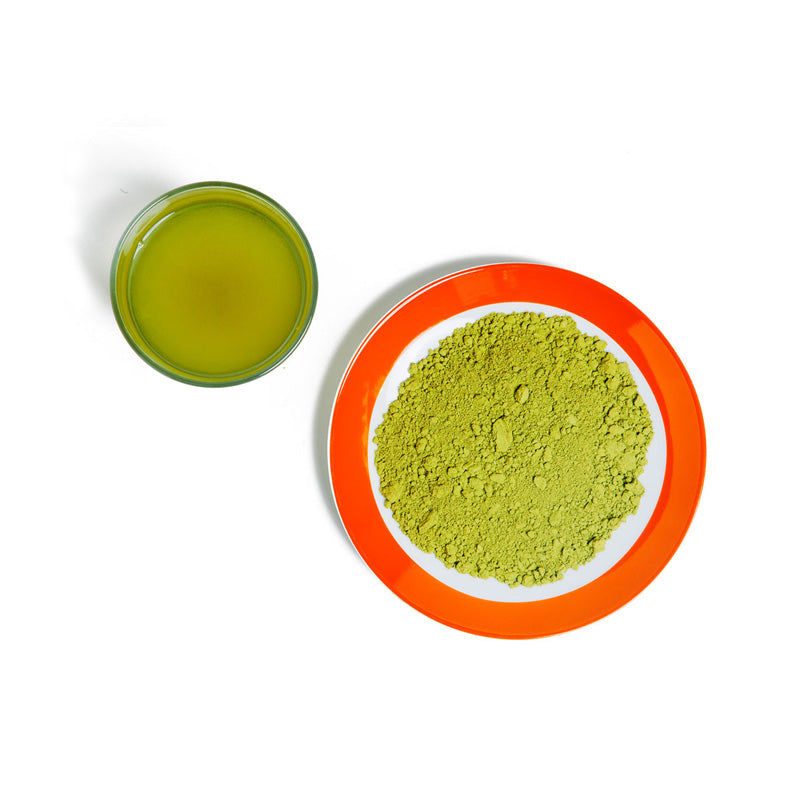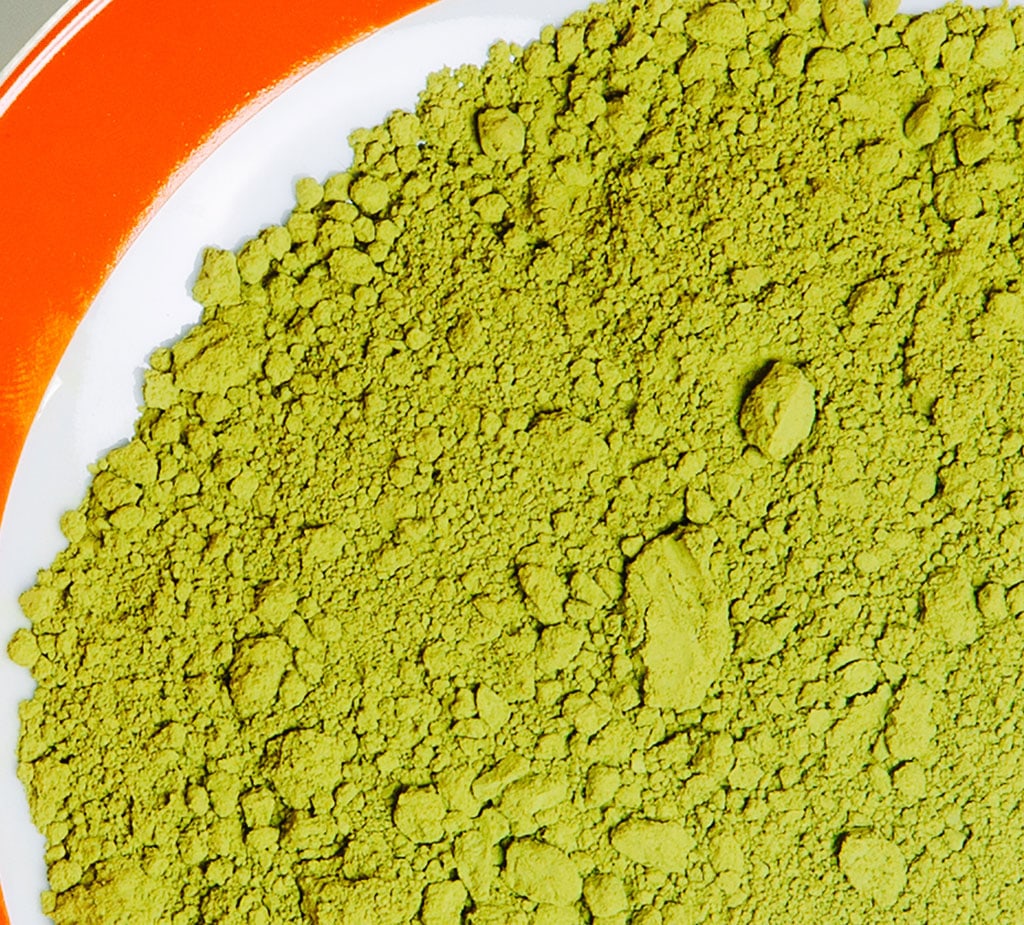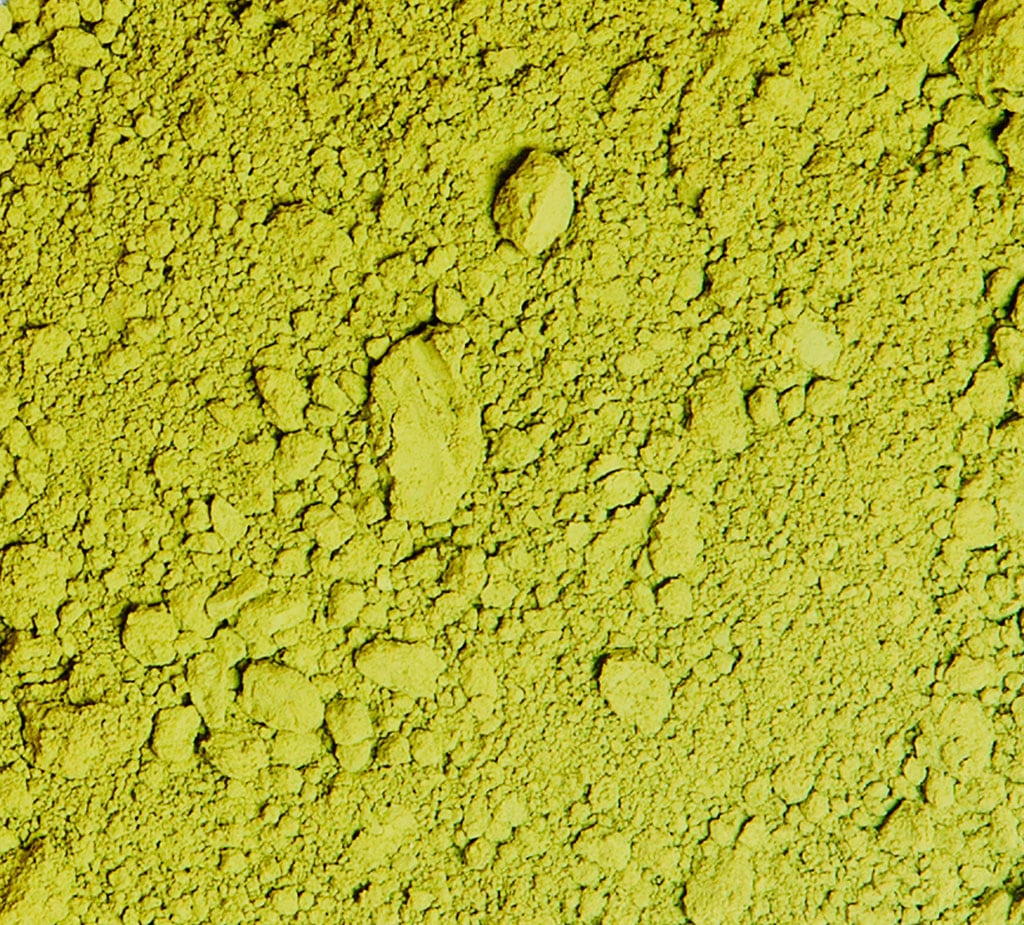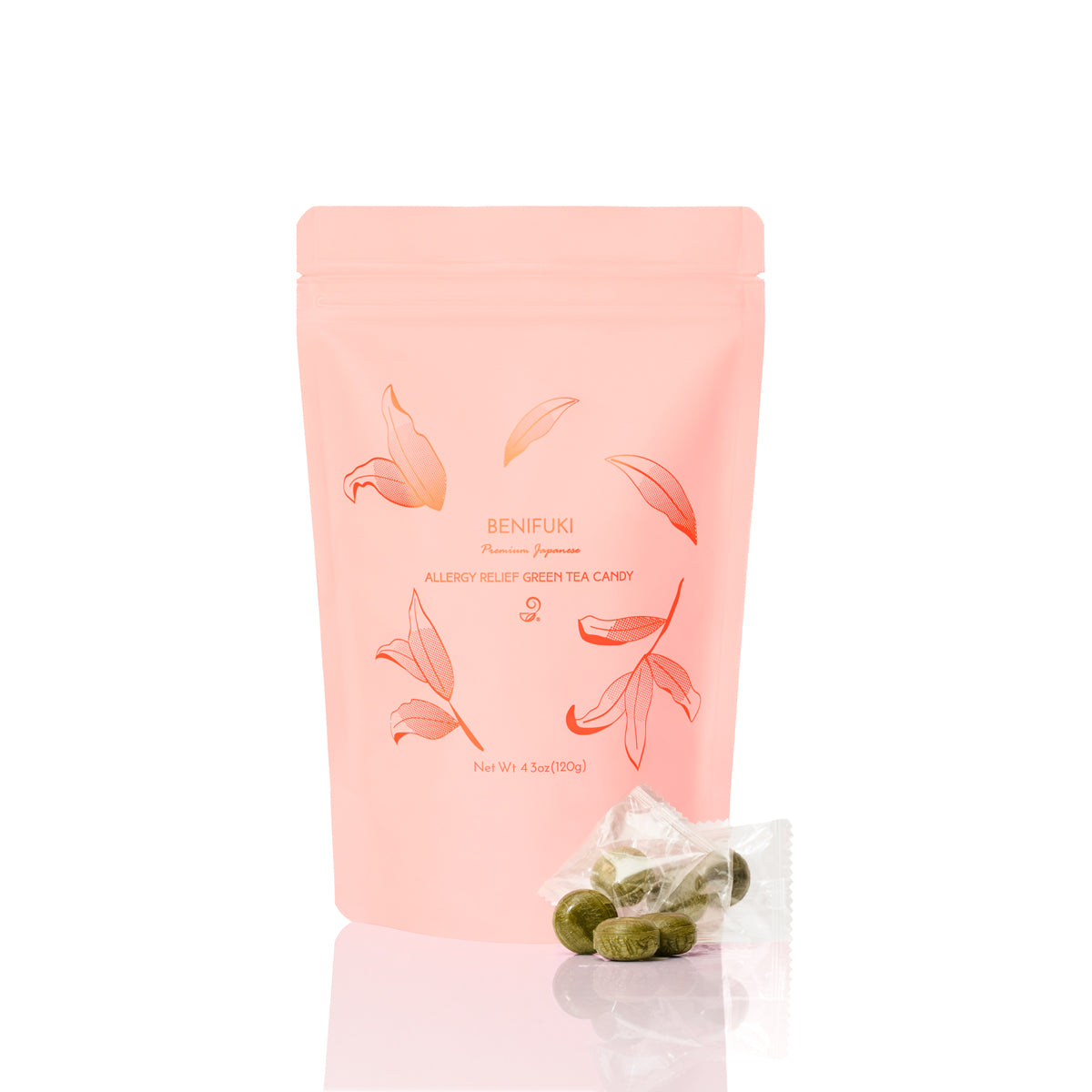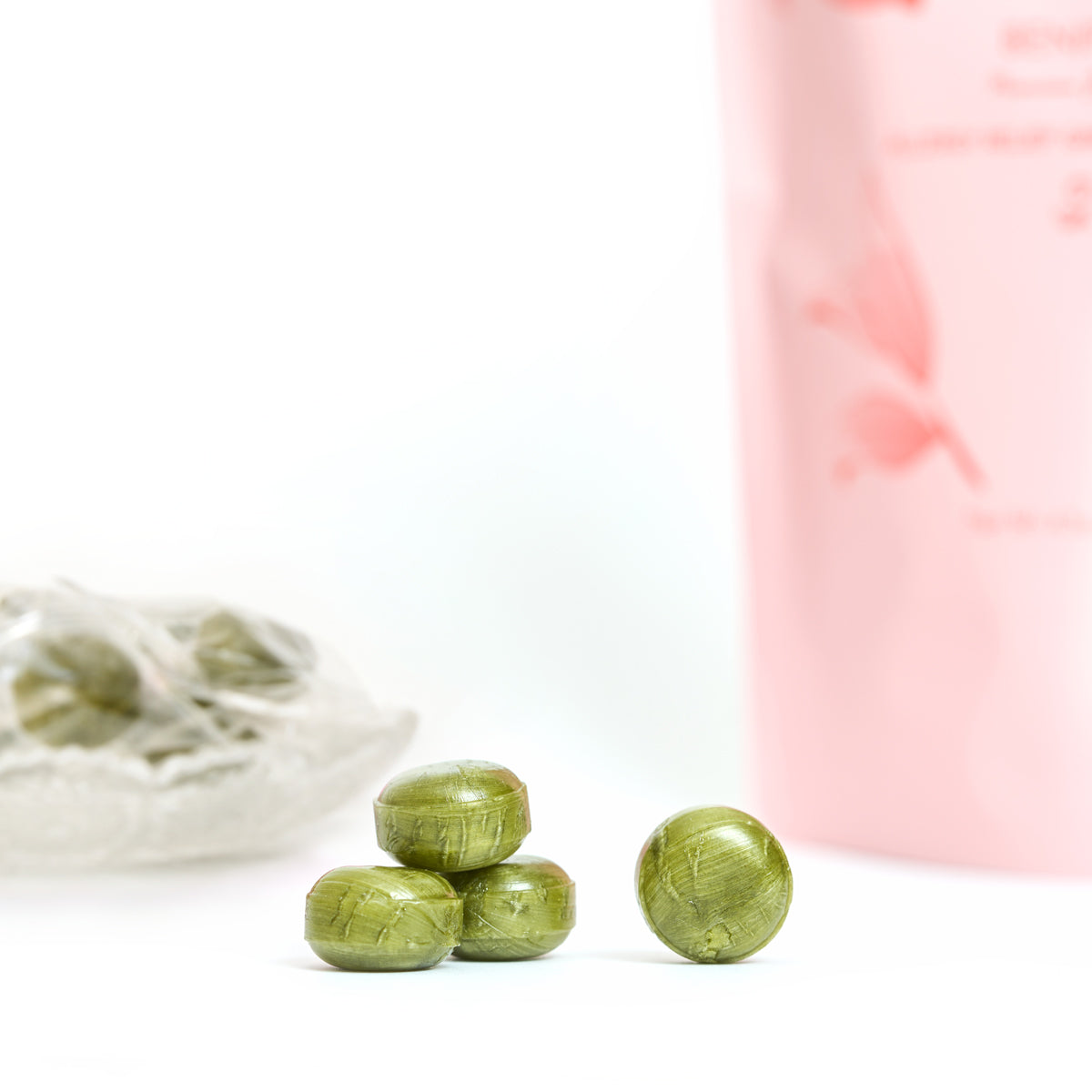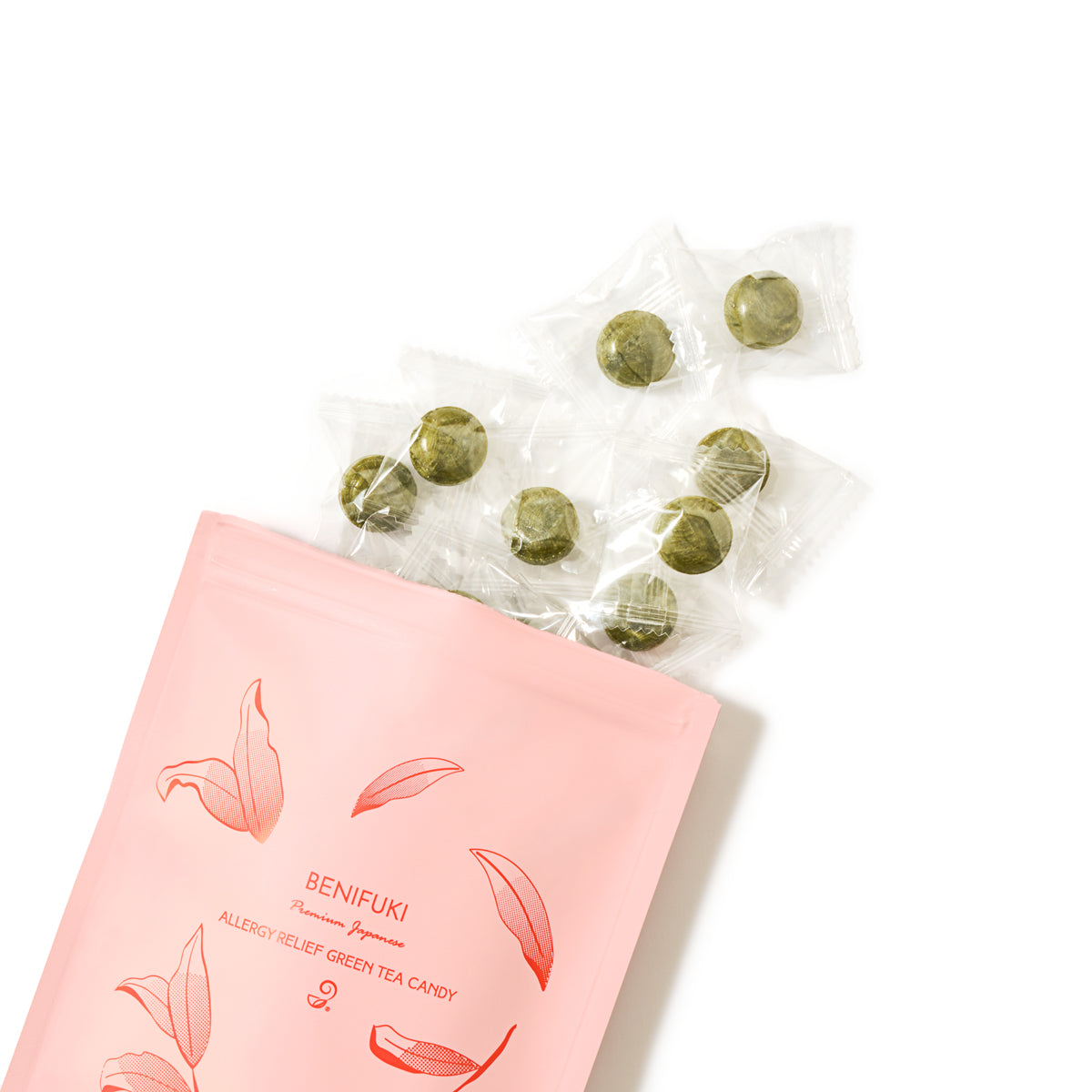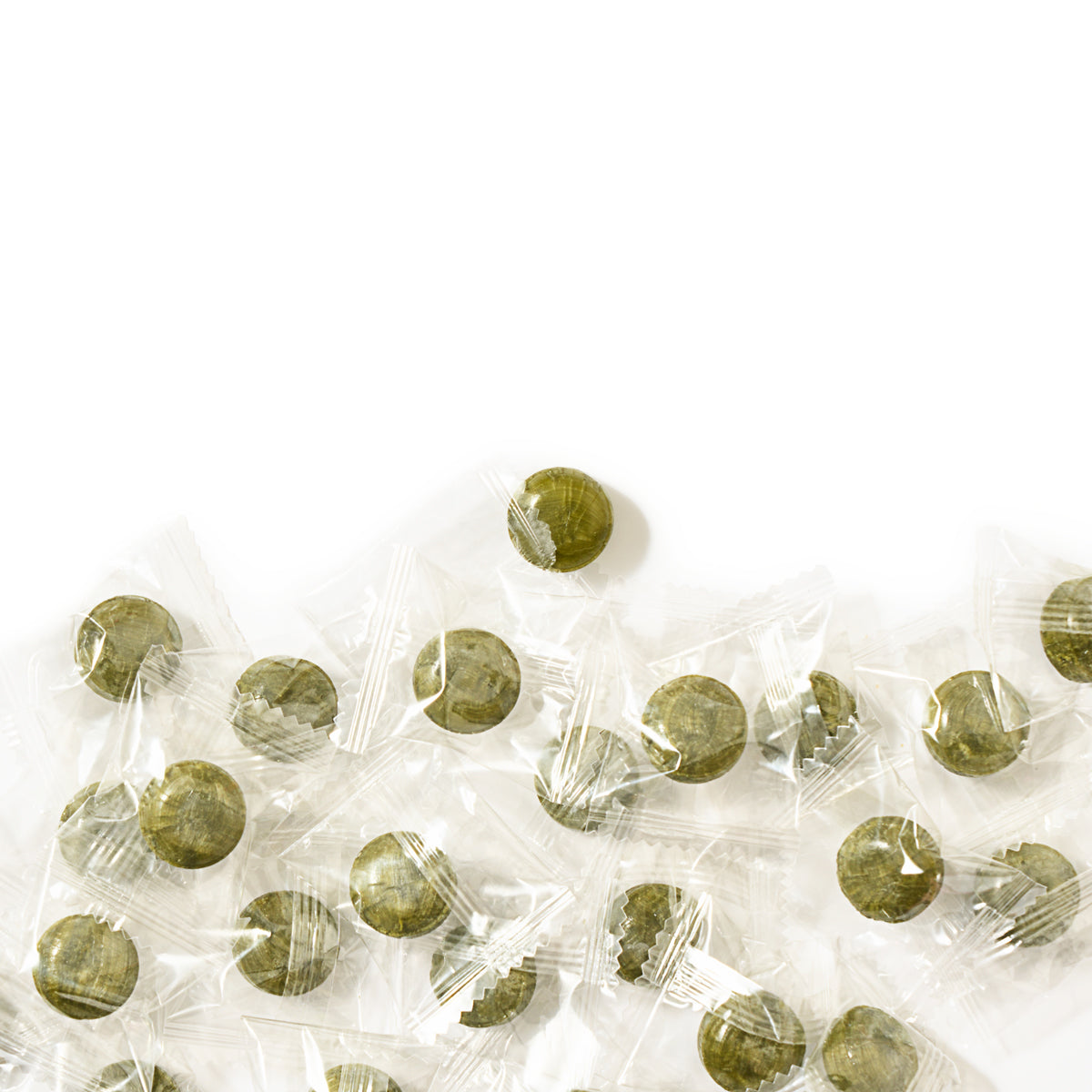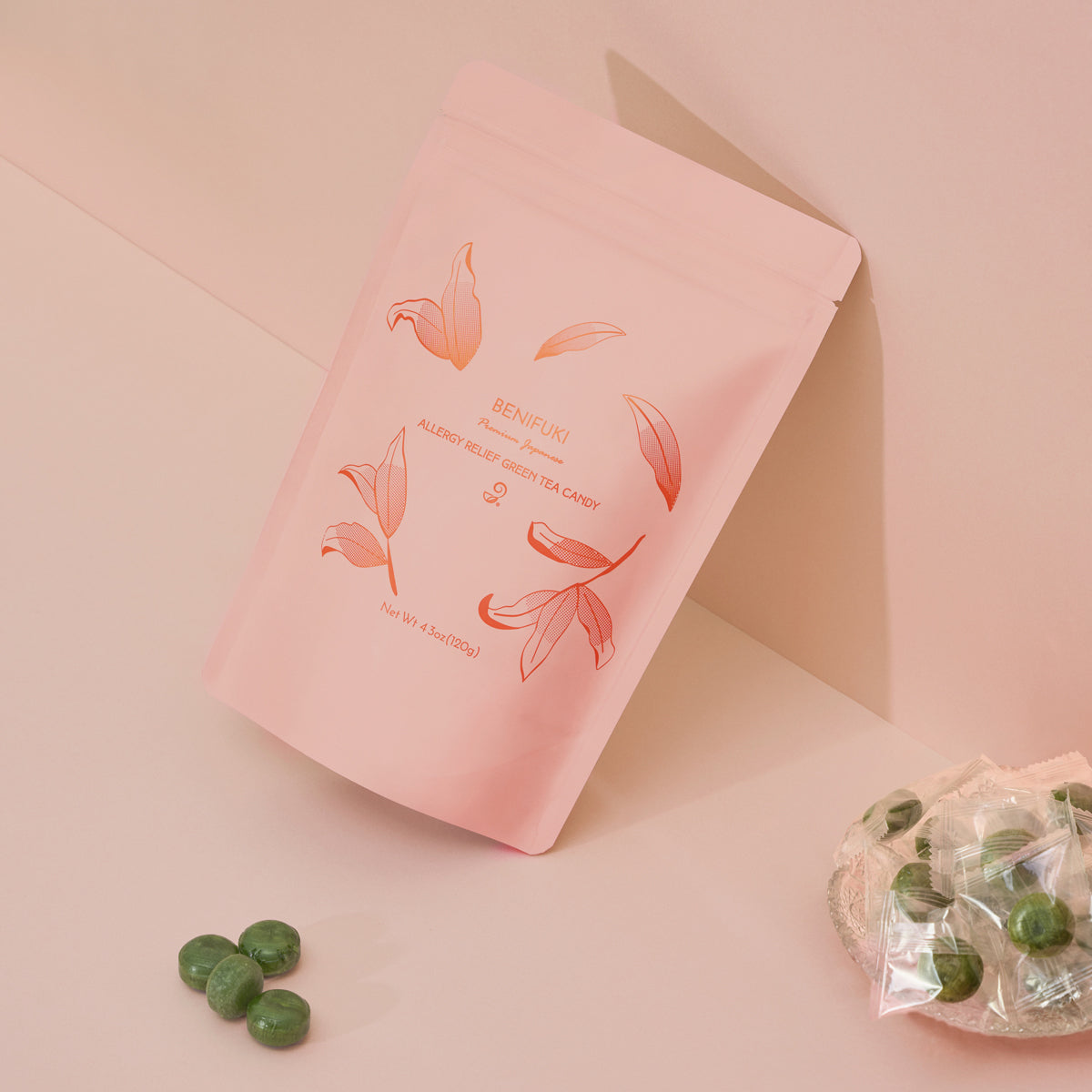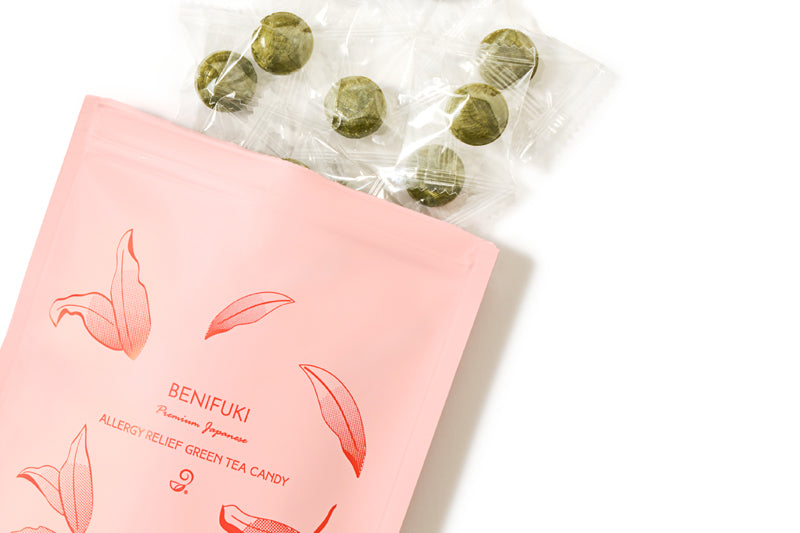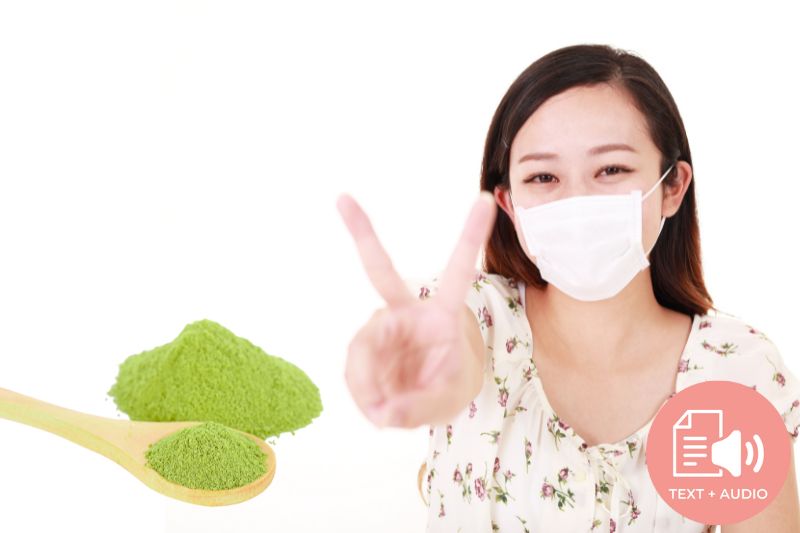Good news: Benifuuki tea could be the key to unlocking relief from the discomfort of MCAD!
If you've been living with Mast Cell Activation Syndrome (MCAD), you might be struggling to find relief from pervasive and often debilitating symptoms.
This serious and chronic disease often baffles medical professionals who find it difficult to diagnose and identify its triggers. The traditional approach for treating MCAD is through diphenhydramine such as Benadryl or hydroxyzine.
Unfortunately, the side effects of using diphenhydramine are often not much better than those caused by the disease itself. Ranging from dizziness to digestive issues and drowsiness, the treatment may feel conflated with side effects from the disease itself.
If you're feeling helpless in your search for relief from MCAD, we are here to help! There is a more natural approach to consider that could ease the lifelong symptoms of MCAD you've been battling.
For those managing MCAD, the constant balancing act between symptom control and medication side effects can feel overwhelming. What makes the condition even more frustrating is the unpredictable nature of triggers—from foods and environmental allergens to stress and temperature changes. This makes consistent relief difficult to achieve through conventional pharmaceuticals alone. That’s why many individuals with MCAD are turning to integrative and functional medicine approaches that support the body’s natural regulatory systems. Benifuuki tea, with its high concentration of bioactive compounds like methylated catechins, offers a promising plant-based solution that not only soothes histamine responses but also supports overall immune modulation—without the sedative drawbacks of antihistamines.
Benifuuki Green Tea
Benifuuki green tea is being used more and more to alleviate the effects of MCAD, with the practice starting in Japan and gaining momentum in recent years.
There are many reasons to choose a more holistic approach to lessening the symptoms of a serious disease. Freeing yourself from the pressure to use more traditional medicine may be the right choice for you. Especially if you're looking to be kind to your body and not exacerbate any of the already serious symptoms you're dealing with!
What sets Benifuuki apart from other green teas is its unique composition—especially its unusually high levels of methylated EGCG (epigallocatechin gallate), a potent antioxidant known for its anti-inflammatory and mast cell-stabilizing effects. Unlike conventional green tea varieties, Benifuuki is specifically cultivated and fermented to enhance these therapeutic compounds. This makes it not just a soothing daily beverage but a functional remedy that aligns with holistic healing practices. For those living with MCAD, where even minor bodily imbalances can trigger severe reactions, incorporating Benifuuki into their wellness routine offers a gentle yet effective way to support immune health and reduce flare-ups naturally.
What Is Benifuuki?
Benifuuki is a relatively new type of Japanese green tea. It was first created in 1965 when the tea cultivars Assamica and Sinensis were cross-bred in Japan. Before long, it was categorized as one of the most effective green teas for fighting allergens.
(Read more about the power of Benifuuki green tea for allergies in this post)
Tea brewed from the Benifuuki plant is produced by utilizing the entire plant, leaves and flowers and all, to brew a unique and powerful strain of tea.
This cultivar is rich in methylated catechins, an active ingredient in many green teas known to inhibit mast cell response to allergens. Scientists have shown that methylated catechins (in particular one type called EGCG) can specifically inhibit activation of mast cells so they do not release their contents in response to allergens or other stimuli.
To learn more about methylated catechins and allergens, visit this link.
Methylated catechin levels in Benifuuki teas are extremely high. This leads researchers to believe Benifuuki to be one of the most impactful teas for drinkers in terms of its positive effects on health!
In addition to its allergy-fighting abilities, Benifuuki's unique phytochemical profile also includes compounds that support metabolic health, liver function, and the regulation of inflammatory responses throughout the body. Unlike common green tea strains that are typically harvested young and minimally processed, Benifuuki undergoes a specialized fermentation and maturation process that enhances its bioavailability and potency. This makes it particularly suitable for individuals with chronic inflammatory or immune-related conditions like MCAD. As more studies explore the tea’s role in regulating histamine levels and lipid metabolism, Benifuuki is increasingly recognized not just as a traditional beverage, but as a nutraceutical—a functional food with therapeutic value.
Consuming Benifuuki Tea
To cultivate mass amounts of these effective catechins in the Benifuuki cultivar, strains are fermented and stored for at least three months. That means this powerful plant is most effective if digested toward the end of its lifespan.
But because there are such large amounts of catechins within the Benifuuki strain, it shouldn't be consumed on an empty stomach. It should also not be allowed to steep in hot water for long periods of time before consumption, as the plant’s toxicity levels could possibly increase.
Small amounts of Benifuuki go a long way. It is not necessary or recommended for drinkers to ingest Benifuuki daily, making it an uncomplicated and powerful solution to chronic symptoms caused by MCAD.
In fact, Benifuuki is so powerful and diverse in its effects, drinkers looking to relieve themselves of MCAD symptoms may also find themselves benefitting from improved health overall, even outside of their disease.
For best results, it's recommended to brew Benifuuki at temperatures around 70–80°C (158–176°F) for no more than 2–3 minutes to preserve its beneficial compounds without increasing bitterness or toxicity. Many MCAD sufferers find success incorporating Benifuuki into a broader wellness routine—pairing it with anti-inflammatory foods, low-histamine diets, or natural supplements. Some even find it helpful to cycle their consumption seasonally or during periods of heightened symptoms. Because Benifuuki is so concentrated in bioactive compounds, its benefits tend to compound over time, making even intermittent use an effective strategy for long-term symptom management and whole-body support.
Other Positive Effects
The plant is gaining popularity worldwide as a homeopathic cure for multiple conditions with great effect. It's easily accessible and a great solution for those looking for relief from the constraints imposed upon them by medical insurance in relation to medications they are able to expense.
Benifuuki is also helpful for hay fever, dermatitis, eczema, histamine reduction, Diet-Induced Lipid Metabolism Disorder, Gaucher Disease, and Tay-Sachs disease. The methylated catechins in Benifuuki have many and varied health effects, making it a multi-faceted cure.
In the best-selling nutrition book, "How Not to Die: Discover the Foods Scientifically Proven to Prevent and Reverse Disease By Michael Greger M.D.'', Dr. Michael also recommends Benifuuki for allergies in the section about beverages.
Emerging research also points to Benifuuki's potential in managing metabolic syndrome, reducing LDL cholesterol, and even supporting cognitive function due to its antioxidant and anti-inflammatory properties. Because it targets underlying inflammation—a common factor in many chronic diseases—Benifuuki may offer complementary support for conditions ranging from autoimmune disorders to cardiovascular risk. As more integrative medicine practitioners and functional nutritionists explore the tea’s benefits, it continues to bridge the gap between traditional remedies and evidence-based natural healing. Its accessibility and low-risk profile make it an appealing option for those seeking both preventative care and relief from ongoing health challenges.
What is Mast Cell Activation Syndrome (MCAD)?
Mast Cell Activation Syndrome (MCAD) is an incurable disease that is often difficult to diagnose. Symptoms and causes of the disease can vary greatly.
MCAD is caused by inappropriate mast cell activation, causing a wide variety of negative symptoms. MCAD can result in a number of dermatological problems, including hives, itching, easy bruising, and a change in complexion.
Cardiovascular effects of MCAS may include vertigo and an increased resting heart rate. MCAD may also cover gastrointestinal problems, vision issues, and respiratory conditions including congestion, wheezing, and sleep apnea.
A few of the psychiatric effects of MCAD include debilitating headaches, fogginess leading to memory dysfunction and recall, as well as anxiety, depression, mood swings, and more.
One of the biggest challenges with MCAD is its overlap with other conditions such as allergies, autoimmune disorders, fibromyalgia, and even chronic fatigue syndrome. This often leads to delayed or misdiagnosis, leaving patients without appropriate treatment for years. Since mast cells exist in nearly every tissue of the body—from the skin and respiratory tract to the gastrointestinal system and brain—the symptoms of MCAD can be systemic and highly individualized. Triggers can vary wildly between patients, making a one-size-fits-all treatment approach ineffective. For many, a comprehensive management plan that includes dietary changes, environmental controls, and natural supplements like Benifuuki tea becomes essential to improving quality of life and reducing flare-ups.
Triggers
The symptoms of MCAD are so varying, they can be difficult to attribute to MCAD. What’s more, MCAD triggers vary greatly as well, with stressors ranging from foods, fragrances, stress, exercise, various chemicals, and more.
In fact, because the triggers for MCAD can seem mundane, those with MCAS may find themselves discovering additional triggers after years of living with the disease.
As this disease is varied in triggers and symptoms, difficult to diagnose and impossible to cure, those with MCAD find themselves with a difficult road ahead of them. MCAD sufferers’ only recourse is to find solace in temporary solutions that they can only hope will slightly ease their symptoms.
The results of MCAD vary greatly person to person. But increased amounts of lipids and histamines are culprits of some of the more serious repercussions of the disease. Traditional treatments of MCAD rely heavily on blocking mast cell responses which are dysfunctional in those living with MCAD.
Mast cell dysfunction presents itself in the less serious form of allergies.
MCAD works similarly to allergies in that it is caused by varying triggers and is not always present. It is, however, always dormant within the sufferer. This means that unlike those suffering from, say, pollen-based allergies, they will likely not find any seasonal relief from their symptoms.
Managing MCAD often becomes a lifelong puzzle of trial and error, where even minor lifestyle changes can either calm or provoke a flare. Patients may spend years keeping detailed symptom journals, undergoing elimination diets, or avoiding entire environments just to identify hidden triggers like preservatives, fabrics, or even changes in air pressure. This unpredictability leads many sufferers to seek solutions that go beyond conventional antihistamines, which may lose effectiveness over time. Natural mast cell stabilizers—like the methylated catechins found in Benifuuki tea—offer a gentler, more sustainable way to support the body’s ability to cope with such unpredictable exposures. By strengthening baseline tolerance rather than simply masking symptoms, they help create a more resilient internal environment for those living with MCAD.
Major Symptoms
Symptoms of MCADs tend to wax and wane and gradually get worse over time. They involve most systems throughout the body.
Some of the major symptoms include:
- Hives
- Itching
- Dizziness and fainting
- Irregular heartbeat
- Diarrhea and/or constipation
- Difficulty swallowing
- Burning sensations in the bladder
- Headaches
- Memory dysfunction and cognitive difficulties
- Psychiatric and behavioral symptoms
- Coughing and wheezing
- Fatigue
Why Benifuuki Tea Works With MCAD
The methylated catechins which permeate Benifuuki tea are popular with allergy sufferers because they help to block mast cell response. The effects of Benifuuki on mast cells are beneficial to those suffering from MCAD and may provide some of the only preventative relief to those suffering from the disease.
Moreover, these same methylated catechins can help those suffering from MCAD to properly process excess lipids and histamines which their disease prevents them from being able to do on their own.
Improper mast cell activation, coupled with excess lipids and histamines, can lead to a wide variety of serious consequences from digestive issues to mental fog and depression.
Therefore, any relief from these misfirings that can be provided by methylated catechins present in Benifuuki tea cannot be understated. Even nominal relief from excess lipids can make a world of difference for indigestion, for example.
What makes Benifuuki particularly compelling for MCAD sufferers is its dual-action support: not only does it stabilize mast cells to prevent the excessive release of histamines and inflammatory mediators, but it also aids in metabolic regulation, which is often compromised in chronic inflammatory conditions. This systemic benefit can ease a range of symptoms that might otherwise seem unrelated—such as brain fog, bloating, or unexplained fatigue. Unlike synthetic antihistamines that merely block receptors temporarily, methylated catechins may help modulate the underlying cellular response. Over time, this may promote a more balanced immune system and reduce the frequency and severity of flare-ups, making Benifuuki a valuable long-term ally in managing MCAD naturally.
Benifuuki Strongly Inhibits Mast Cell Activation
Mast cells play an important part in normal bodily regulatory processes. In healthy persons, mast cells function to heal wounds and work within the immune system to fix pathogens.
In those suffering from allergies, mast cell inhibition can help provide relief for their symptoms. For those living with MCAD, the mast cell inhibiting properties of Benifuuki tea can potentially be life-changing.
While the methylated catechins present in Benifuuki cannot cure MCAD, they can help alleviate symptoms. Benifuuki contains more methylated catechins than any other strain of tea, meaning those looking for any sort of relief, homeopathic or otherwise, would do well to try Benifuuki’s effects for themselves.
What further sets Benifuuki apart is how efficiently its methylated catechins interact with the body's immune signaling pathways. These compounds help calm the hyper-reactive mast cells that are central to MCAD, reducing the likelihood of spontaneous or exaggerated allergic-like reactions. Unlike general green teas, which contain catechins in less bioavailable forms, Benifuuki’s unique fermentation process enhances the body’s ability to absorb and utilize these compounds. This makes it a potent, natural support tool that can fit seamlessly into daily life—especially for those seeking relief without the sedating or cumulative side effects of pharmaceutical mast cell stabilizers.
Benifuuki Green Tea Has Lipid-Lowering Effects
Another benefit of the methylated catechins present in Benifuuki is its effect on lipids. Those with MCAD can find themselves having difficulty breaking down fats. Because of this, the process of converting food into energy is disrupted, resulting in dangerously low blood sugar.
Those with MCAD have difficulty processing and breaking down fats and lipids, resulting in dangerous excess. When this happens, digestive issues and lethargy abound. Those undiagnosed or newly diagnosed with MCAD may not even recognize these as part of their disease, an example of the discreetly destructive nature of the disease.
Luckily, Benifuuki green tea can greatly lower lipids in the body. Casual drinkers look to this strain of green tea for weight loss benefits. But those suffering from MCAD can also experience great relief through drinking Benifuuki.
The methylated catechins strongly present in Benifuuki provide these effects. Scientists do warn that those unaccustomed to drinking tea with such high levels of catechins may find it difficult to stomach high amounts of the tea.
To fully feel the full effects of the catechins and their relation to lipids, drinkers should be sure to drink Benifuuki regularly, yet sparingly.
Drinkers looking to regulate their lipid levels should work their way up to drinking high amounts of Benifuuki over time. Start with nominal amounts and work your way up to becoming a seasonal Benifuuki drinker to feel the tea’s full effects.
In addition to supporting lipid breakdown, the antioxidant properties of methylated catechins in Benifuuki help reduce oxidative stress—a key factor in lipid peroxidation and inflammation. By minimizing cellular damage and supporting metabolic efficiency, this tea can contribute to more balanced energy levels and improved digestive comfort. For individuals with MCAD, where sluggish fat metabolism can trigger a cascade of symptoms, incorporating Benifuuki as part of a balanced diet may offer a gentle yet impactful boost to their body’s natural regulation processes. As always, consistency over time—rather than quantity—is what makes this tea most effective.
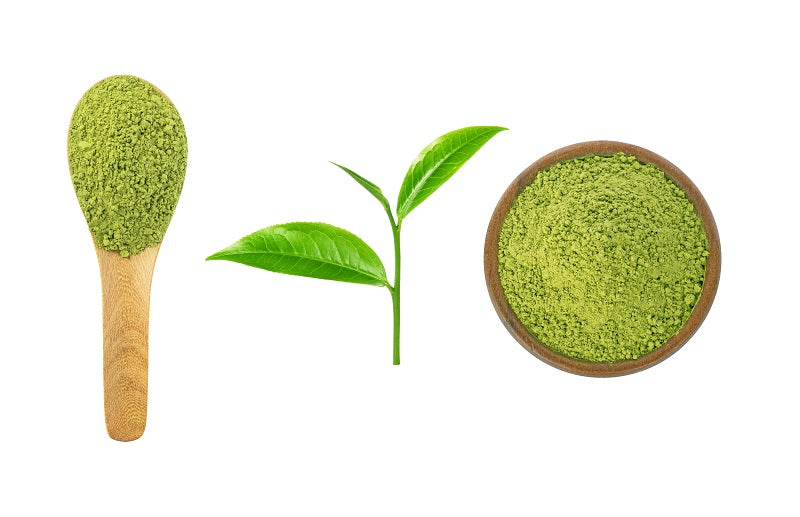
Benifuuki Tea Reduces Histamine Levels
Histamines are indispensable chemicals for the human brain. Histamines facilitate communication with the brain and overall digestion.
Dysfunctional histamine processing can lead to a variety of medical problems.
These include:
- Fatigue
- Vomiting
- Cramping
- High blood pressure
- Anxiety
Histamine Intolerance
Many of these symptoms match up with symptoms of MCAD. This is because what many physicians may originally believe to be histamine intolerance is actually a form of MCAD. Histamine intolerance is just one of many conditions MCAD can be easily conflated with thanks to the similarity of their symptoms and causation.
MCAD can lead to histamine intolerance, although histamine intolerance itself can exist outside of MCAD. Symptoms of histamine intolerance are aggravated by foods high in histamines. Those with the condition find their mast cells to be overactive and do not allow them to process histamines correctly.
The previously mentioned core component of Benifuuki strain green tea methylated catechins helps to reduce histamine levels within the body. Because those with MCAD find themselves unable to process histamines correctly, Benifuuki catechins once again prove to be invaluable to treating the condition.
Methylated catechins cannot help the body to relearn how to process histamines correctly, just as they cannot provide lasting effects in regards to lipids or mast cells, but they can aid the body in ridding itself of excess.
This sort of removal is the closest MCAD suffers can come to any sort of restoration of these proper bodily functions.
This distinction between histamine intolerance and MCAD is crucial for patients seeking appropriate relief. While both conditions involve histamine overload, the underlying causes differ—and so do the management strategies. What makes Benifuuki tea especially beneficial is its gentle support in flushing out excess histamines without suppressing the body's natural functions. Rather than acting as a blocker, the methylated catechins help modulate histamine activity at the cellular level, offering relief without the fatigue or rebound effects common with over-the-counter antihistamines. This makes Benifuuki a valuable daily ally for individuals managing histamine sensitivity, whether or not it’s rooted in MCAD.
Benifuuki Is Good For Liver
Another beneficial characteristic of Benifuuki is its effect on the liver.
The liver is the primary organ in the body that processes fats and lipids. If dietary cholesterol is insufficient, the liver synthesizes cholesterol and releases it into the bloodstream. The liver also breaks down fats and converts them into glucose, which is released into the bloodstream for use as immediate energy to fuel the body's activities.
In a normal, healthy body, the liver tightly regulates levels of serum lipids and breaks down excess fat into glucose.
But in response to chronic inflammation induced either by an unhealthy diet or other causes, the liver starts to malfunction. It becomes unable to tightly regulate serum lipid levels. Ultimately, elevations in LDL and triglycerides may occur while HDL levels plummet.
Instead of the liver breaking down excess dietary fat, it is stored at various places in the body (such as the abdomen) and fat is also stored in the liver, creating a fatty liver, which further perturbs liver function.
Benifuuki’s high concentration of methylated catechins offers targeted support in restoring the liver’s natural detoxification and metabolic processes. These compounds help combat oxidative stress and reduce the low-grade inflammation that often underlies liver dysfunction. By supporting better fat metabolism and promoting the breakdown of stored lipids, Benifuuki may aid in preventing or even reversing early stages of fatty liver. This is especially important for individuals with MCAD or related inflammatory conditions, where liver strain is commonly exacerbated by chronic immune activity. Incorporating Benifuuki as part of a liver-friendly lifestyle—alongside hydration, antioxidant-rich foods, and low-histamine nutrition—can make a meaningful difference in long-term liver resilience and overall metabolic balance.
Reducing Global Inflammation
Benifuuki green tea's ability to reduce global inflammation in the body also seems to have a beneficial effect on liver function, prompting the liver to reverse course and start to process lipids in a more normal way. For starters, this can be beneficial for weight loss because it helps the metabolism clear excess fat out of the body. At the same time, it can also restore the serum lipid levels to a healthier profile.
At the same time, the processes that lead to the formation of a fatty liver may begin to reverse in response to Benifuuki, further improving liver function.
An interesting side effect of the high levels of methylated catechins in Benifuuki is that this tea plant is naturally resistant to most plant diseases.
Most tea plants require the use of chemical pesticides and fungicides during production. This means the resulting tea is probably contaminated with residual chemicals from these products.
But not Benifuuki! It can be grown without the need for any chemical applications, which is good for both the environment AND the consumer.
This natural resistance to pests not only preserves the purity of Benifuuki but also contributes to its anti-inflammatory strength—since the absence of pesticide residue reduces the toxic burden on the body, especially for individuals with chemical sensitivities or chronic inflammation like MCAD. Lower systemic inflammation means less immune overactivation, giving the liver and other organs a better chance to function optimally. Furthermore, by reducing inflammatory markers throughout the body, Benifuuki may also support healthier skin, improved energy levels, and better gut health—making its benefits far-reaching for those pursuing a cleaner, more holistic approach to wellness.
What Are The Side Effects Of Benifuuki Tea?
As a natural green tea, Benifuuki has never been observed to have any side effects when consumed properly.
It's a refreshing beverage that can be enjoyed several times a day, aiding in hydration as well as in reducing inflammation and providing the many health benefits of regular green tea consumption.
Due to its high levels of methylated catechins, Benifuuki has a more bitter taste than most other green teas, but many consumers enjoy its bitterness.
Interestingly, when Benifuuki was first developed, it was practically inedible due to its extreme level of bitterness. But cultivation methods have reduced its bitter flavor to a level that's enjoyable without affecting its medicinal qualities. These include those that involve growth in soil from sugarcanes and mulching with vegetation from natural grasslands.
Casual drinkers of Benifuuki enjoy it for the allergy-numbing effects it provides, as well as the metabolic regulation. Drinkers will enjoy clearer skin, better digestion, and increased energy by incorporating Benifuuki into their diets regularly.
Benifuuki has many beneficial effects in terms of health. But as with all powerful medical solutions, drinkers should be sure to take a few precautions.
Because of its potency, moderation is key when incorporating Benifuuki into your routine. Those new to the tea may experience mild digestive sensitivity or nausea if consumed on an empty stomach or in excessive amounts. It’s best to start with a small serving—around half a cup—once daily, ideally with food, and gradually build up as your body acclimates. Additionally, individuals with liver concerns, iron absorption issues, or sensitivity to caffeine should consult with a healthcare provider before long-term use. While side effects are rare, listening to your body and observing how it responds to Benifuuki is essential to enjoying its many benefits safely and effectively.
Precautions
As briefly mentioned earlier, waiting too long to drink Benifuuki after it's brewed can be dangerous. This is because chlorophyll can build up over time. This raises the tea’s toxicity to potentially dangerous levels if it sits out too long or the tea’s leaves have remained within the tea after it has been prepared.
An important aspect of Benifuuki is that it's brewed with both the leaves and flowers. But brewers can't forget to remove the toxic leaves before consuming it!
Additional Benifuuki-related nausea is easily circumvented by drinking the tea right after it's brewed.
So, in summary, ensure you're not drinking Benifuuki on an empty stomach and follow it up with large amounts of water to minimize any potential liver damage from the powerful catechins.
To further reduce any risk, it’s best to use filtered water and steep Benifuuki at lower temperatures (around 70–80°C or 158–176°F) for just a few minutes—prolonged brewing can release excessive catechins and bitterness. Always strain the tea thoroughly to remove leaves and flowers before drinking, as allowing them to sit can intensify chlorophyll levels and increase the risk of gastrointestinal discomfort. It’s also wise to store Benifuuki leaves in a cool, dark place in an airtight container to preserve their potency and prevent oxidation. By handling this tea with care and awareness, you can maximize its healing potential while minimizing the likelihood of adverse reactions.
Conclusion
Benifuuki Japanese green tea is a delightful, refreshing, bitter tea made from the tea cultivar Benifuuki.
This tea cultivar has a very high concentration of methylated catechins, in particular one called ECGC. ECGC blocks mast cell activation by allergens and the many stimuli that activate mast cells in individuals with MCADs.
Activated mast cells normally release large amounts of histamines that trigger the symptoms familiar to allergy sufferers worldwide.
For people with MCADs, their mast cells abnormally release histamines throughout their bodies, causing a wide range of unpleasant symptoms. Consuming Benifuuki on a regular basis blocks mast cells from releasing histamines. This naturally relieves the symptoms of allergies and MCADs without any side effects you might get from drugs.
Besides its effects on mast cells, Benifuuki can help relieve other conditions caused by chronic inflammation.
Its high levels of methylated catechins can reverse dysfunction of the liver. This can restore the liver's ability to process lipids and fats.
Once restored to a more normal function, the liver can reduce levels of unhealthy blood lipids. Then, it can metabolize fats. This promotes weight loss, alleviates cardiovascular risk factors, reduces the effects of metabolic syndrome, and reverses the processes causing fatty liver.
In brief, Benifuuki is a healthful addition to any person's day whether they suffer from allergies/MCADs or not!
Are you ready to explore what Benifuuki tea can do for you? Click here to shop our selection of allergy relief Japanese green tea!
In an age where more people are seeking natural, side-effect-free solutions to chronic health issues, Benifuuki stands out as a rare gem—blending centuries-old Japanese tea tradition with modern health science. Its ability to support immune regulation, liver function, and metabolic balance makes it more than just a remedy for MCAD or allergies; it’s a daily ritual that nourishes the body from the inside out. Whether you’re dealing with specific symptoms or simply looking to enhance your overall well-being, adding Benifuuki green tea to your wellness toolkit is a small but powerful step toward a more balanced, resilient life.
This article was first published in 2019. It was updated in 2025 just for you!
What is Benifuki Tea? Explained in One Minute
Click here to jump to the Youtube Video
Watch me explain about Benifuki to ChaCha
Click here to jump to the Youtube Video
• Disclosure: I only recommend products I would use myself, and all opinions expressed here are my
own. This post may contain affiliate links that I may earn a small commission at no additional cost to you.
The commission also supports us in producing better content when you buy through our site links.
Thanks for your support.
- Kei and Team at Japanese Green Tea Co.
Get Free Bonus Books

Sign up for free to the Green Tea Club to get advice and exclusive articles about how to choose Japanese Tea, and tips, tricks, and recipes for enjoying Japanese tea.
About the author
Kei Nishida
Author, CEO Dream of Japan
Certification: PMP, BS in Computer Science
Education: Western Washington University
Kei Nishida is a passionate Japanese green tea connoisseur, writer, and the founder and CEO of Japanese Green Tea Co., a Dream of Japan Company.
Driven by a deep desire to share the rich flavors of his homeland, he established the only company that sources premium tea grown in nutrient-rich sugarcane soil—earning multiple Global Tea Champion awards.
Expanding his mission of introducing Japan’s finest to the world, Kei pioneered the launch of the first-ever Sumiyaki charcoal-roasted coffee through Japanese Coffee Co. He also brought the artistry of traditional Japanese craftsmanship to the global market by making katana-style handmade knives—crafted by a renowned katana maker—available outside Japan for the first time through Japanese Knife Co.
Kei’s journey continues as he uncovers and shares Japan’s hidden treasures with the world.
Learn more about Kei
